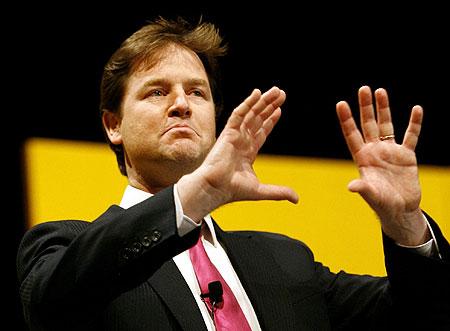Political donations still favour big business

Isn’t it odd that the contributors to Fianna Fáil were those most advantaged by the policies of that party? By Vincent Browne.
Nick Clegg said on Monday that the Conservatives had raised more than £15 million from companies and individuals connected to the City of London – bankers and financiers: big business, in other words – since David Cameron was elected party leader in 2005. The Liberal Democrats make the point that one-tenth of Conservative candidates are bankers or have worked in the sector, and that between Cameron’s election as leader in December 2005 and this election, £109 million in donations was received.
Clegg said the Tories were “the party of choice for rich bankers, and no wonder, when their major tax policy is to give tax breaks to double millionaires”.
The claims are broadly in line with previous reports about the financing of the Conservative Party. They have a massive war chest, enabling them to blitz the country with posters and newspaper advertisements, spend huge sums on opinion polling, and hire expensive media advisers.
Of course, this, on its own, will not win the election for the Tories. But these massive resources give the Tories a huge advantage over other parties. And even if, as a consequence, there is no outright corruption (ie favours done in return for donations), it is a corruption of the democratic process.
This is because it negates the fundamental democratic idea that everyone is equal in deciding the outcome of an election. Those with money disturb that equality by giving the advantage to the party that best serves their interests.
This is all blindingly obvious, and yet in Britain, Ireland, the United States and elsewhere, there is a dogged determination to disregard this fundamental inequity. Recently the US Supreme Court confirmed an earlier judgment affirming the constitutional entitlement of rich people to bias the electoral arena in their favour, under the guise of freedom of speech!
There is also the equally obvious issue of corruption (favours done in return for donations).
Over the weekend the Director of Public Prosecutions, James Hamilton, addressed this issue. “I do not believe that, so long as the private financing of political parties is permitted, it will be possible to eliminate political corruption . . . As long as you allow political parties to receive donations from individuals without any presumption that there is some impropriety, then you are wide open, I think, to a form of corruption,” he said.
“I know there are those who believe that this should be allowed to continue, that it is not a function of the State to pay for political parties, but until you move in that direction and put very strict limits on the amount of money that can be donated to political parties, then you will continue to have corruption of an unprovable sort.”
Writing in these columns eight years ago, I detailed the advertisers in the 75th anniversary brochure of Fianna Fáil: Republican Days: 75 Years of Fianna Fáil . The builder/developer advertisers were: Dunloe Ewart Plc; Maplewood Developments Ltd; The Prem Group; Ascon (the construction company of Southern Cross Motorways, among other ventures); Michael McNamara Company; Jerry Beades Concrete; Gypsum Industries (which claimed to manufacture “the highest quality products for the Irish building industry”); William Mulrooney; Douglas Newman Good; Frinailla Developments; Shelbourne Development; Flynn and O’Flaherty; Hollioake Homes; Kentz (“Ireland’s leading multinational engineering and construction group”); Benton Property Holdings Ltd; Pat Neville Sons Ltd; Parkway Properties Ltd; Gerry O’Reilly Associates Ltd (property developers and project managers and for the Quinn Hotels Group); Donoghue Scaffolding; Dorville Homes; Howard Holdings Plc; McDermott O’Farrell, property developers and construction specialists; Arup (construction company); Shane O’Hanlon, auctioneer, valuers, land and estate agents and financial advisers; Sorohan Builders Ltd; Neville Sons Construction Ltd; McInerney’s property company; Terence McCormack, structural engineers; Murnane and O’Shea Ltd, building contractors; Jim Donnellan Builders Ltd; P Rogers Sons Ltd, building and civil engineering contractors; the Bennett Group (“one of Ireland’s leading construction and property service providers”); Durkan, the property company; Kingscroft Developments Ltd; Treasury Holdings Ltd.
I am not saying and did not say that anyone who advertised in this brochure did so for improper reasons.
But isn’t there something odd about the fact the contributors to Fianna Fáil were those most advantaged by the policies of Fianna Fáil?
Yes, we have laws governing donations to political parties, but they are hopelessly inadequate.
Following the 2007 general election, the Standards in Public Office Commission wrote in its annual report: “During the recent general election there was much comment about expenditure on campaigns by parties and candidates before the election period – which runs from the date of dissolution of Dáil Éireann to polling day. Such expenditure is not subject to regulation under the electoral legislation if the promotional material concerned is not used during the election period.
“There is considerable evidence that many parties ‘front-loaded’ their campaign expenditure on electioneering well in advance of the date of dissolution of the Dáil.”
This was a repetition of previous recommendations made by the commission. What happened? Nothing. As usual.
